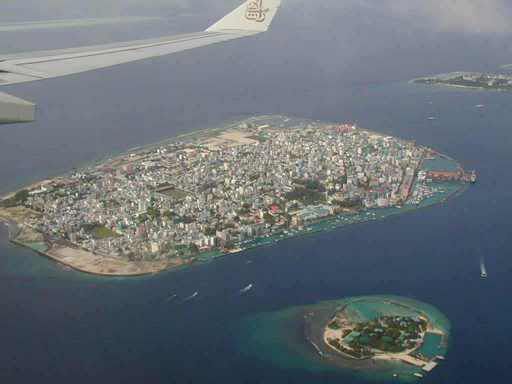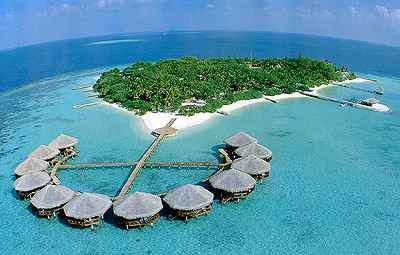
How bad is it that I've HEARD of The Maldives, but didn't know where to find them on the map:
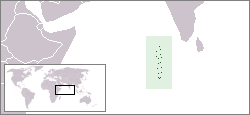
In any case, unlike the average Freeper, I have made it my business to find out.
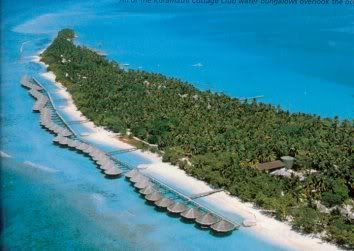
Flag

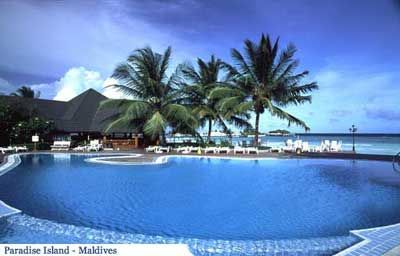
Wikipedia Entry
On 26 December 2004 the Maldives were devastated by a 10 metre high tsunami following the 2004 Indian Ocean earthquake (the waves in the Maldives were only 1.5 meters high, due to its geography 1( http://news.bbc.co.uk/2/hi/south_asia/4148279.stm )). Nearly all of the country was swamped by this tsunami. At least 75 people perished, including six foreigners, and all infrastructure was lost on 13 of the inhabited islands and 29 of the resort islands.History
Main article: History of the Maldives
The early history of the Maldives is obscure. According to Maldivian legend, a Sinhalese prince named Koimale was stranded with his bride--daughter of the king of Sri Lanka--in a Maldivian lagoon and stayed on to rule as the first sultan.
Over the centuries, the islands have been visited and their development influenced by sailors from countries on the Arabian Sea and the Indian Ocean littorals. Mopla pirates from the Malabar Coast--present-day Kerala state in India--harassed the islands. In the 16th century, the Portuguese subjugated and ruled the islands for 15 years (1558-1573) before being driven away by the warrior-patriot and later Sultan, Muhammad Thakurufaanu Al-Azam.
Although governed as an independent Islamic sultanate for most of its history from 1153 to 1968, Maldives was a British protectorate from 1887 until July 25, 1965. In 1953, there was a brief, abortive attempt at a republican form of government, after which the sultanate was reimposed.
Following independence from Britain in 1965, the sultanate continued to operate for another 3 years. On November 11, 1968, it was abolished and replaced by a republic, and the country assumed its present name. Tourism and fishing are being developed on the archipelago.
More:
http://en.wikipedia.org/wiki/MaldivesAlso:
Maldives Ministry of Tourism:
http://www.visitmaldives.com.mv/contents.htmCIA World Factbook
The Maldives were long a sultanate, first under Dutch and then under British protection. They became a republic in 1968, three years after independence. Since 1978, President Maumoon Abdul GAYOOM - currently in his sixth term in office - has dominated the island's political scene. Following riots in the capital Male in August 2004, the president and his government have pledged to embark upon democratic reforms, including a more representative political system and expanded political freedoms. Tourism and fishing are being developed on the archipelago.
Location:
Southern Asia, group of atolls in the Indian Ocean, south-southwest of India
Population:
339,330 (July 2004 est.)
Nationality:
noun: Maldivian(s)
adjective: Maldivian
Ethnic groups:
South Indians, Sinhalese, Arabs
Religions:
Sunni Muslim
Languages:
Maldivian Dhivehi (dialect of Sinhala, script derived from Arabic), English spoken by most government officials
Government type:
republic
Capital:
Male
Administrative divisions:
19 atolls (atholhu, singular and plural) and 1 other first-order administrative division*; Alifu, Baa, Dhaalu, Faafu, Gaafu Alifu, Gaafu Dhaalu, Gnaviyani, Haa Alifu, Haa Dhaalu, Kaafu, Laamu, Lhaviyani, Maale*, Meemu, Noonu, Raa, Seenu, Shaviyani, Thaa, Vaavu
Independence:
26 July 1965 (from UK)
Legal system:
based on Islamic law with admixtures of English common law primarily in commercial matters; has not accepted compulsory ICJ jurisdiction
Executive branch:
chief of state: President Maumoon Abdul GAYOOM (since 11 November 1978); note - the president is both the chief of state and head of government
head of government: President Maumoon Abdul GAYOOM (since 11 November 1978); note - the president is both the chief of state and head of government
cabinet: Cabinet of Ministers appointed by the president
elections: president nominated by the Majlis and then the nomination must be ratified by a national referendum (at least a 51% approval margin is required); president elected for a five-year term; election last held 17 October 2003 (next to be held NA 2008)
election results: President Maumoon Abdul GAYOOM reelected in referendum held 17 October 2003; percent of popular vote - Maumoon Abdul GAYOOM 90.3%
Legislative branch:
unicameral People's Council or Majlis (50 seats; 42 elected by popular vote, 8 appointed by the president; members serve five-year terms)
elections: last held 20 November 1999 (next to be held NA November 2004)
election results: percent of vote - NA; seats - independents 42
Political parties and leaders:
although political parties are not banned, none exist
Economy - overview:
Tourism, Maldives' largest industry, accounts for 20% of GDP and more than 60% of the Maldives' foreign exchange receipts. Over 90% of government tax revenue comes from import duties and tourism-related taxes. Fishing is a second leading sector. The Maldivian Government began an economic reform program in 1989 initially by lifting import quotas and opening some exports to the private sector. Subsequently, it has liberalized regulations to allow more foreign investment. Agriculture and manufacturing continue to play a lesser role in the economy, constrained by the limited availability of cultivable land and the shortage of domestic labor. Most staple foods must be imported. Industry, which consists mainly of garment production, boat building, and handicrafts, accounts for about 18% of GDP. Maldivian authorities worry about the impact of erosion and possible global warming on their low-lying country; 80% of the area is one meter or less above sea level.
Disputes - international:
noneMore:
http://www.cia.gov/cia/publications/factbook/geos/mv.html
The capital city of Male:
